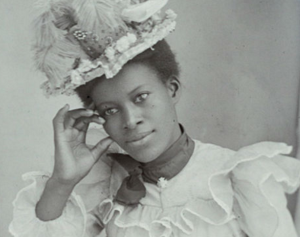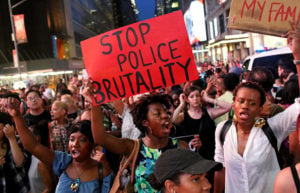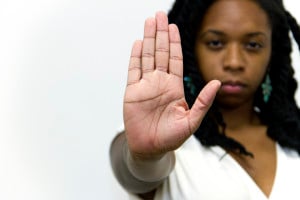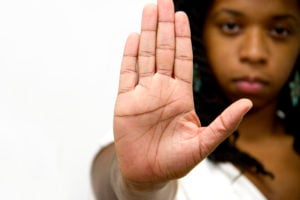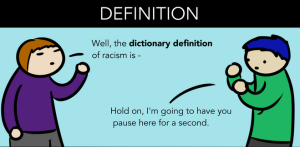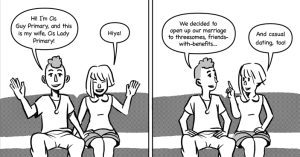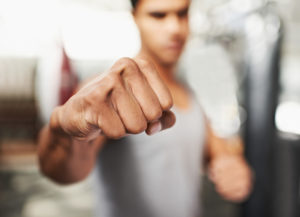
Person throwing a punch.
This article originally appeared in The Huffington Post. It was lightly edited and reposted here with the author’s permission.
Google “toxic masculinity” and you’re likely to stumble across Ben Shapiro’s National Review article The ‘Toxic Masculinity’ Smear, where he discusses the Left’s war on masculinity and manhood.
If you can power through the part where he blames crime in black communities on absent fathers (and fails to address the poverty cycle enforced by white men), you may reach the point of his piece: that toxic masculinity is a concept invented by liberals to emasculate men, strip them of their right to lead families and turn them into “non-entities.”
The main flaw in Shapiro’s argument is his failure to separate masculinity from “toxic masculinity”—two concepts that have little to do with one another.
While many aspects of masculinity are valid, toxic masculinity is a performance.
Toxic masculinity is built on two fundamental pillars: sexual conquest and violence—qualities men regale as manly and virtuous.
If sex and aggression are the measuring sticks of manhood, it’s no wonder rape education remains a conversation of what women should be doing to not get raped rather than what men should be doing, which is not raping.
How can we hope to stop the violent sexual behavior if violence and sexuality are still considered primary virtues of manhood?
We insist on male dominance — that physically stronger means superior — an idea rooted in times of spear-throwing and sword-fighting rather than present day, where machines do most of the building, hunting and fighting for us.
But even in a time where physical strength was a necessary aspect of survival, genders were co-dependent. We need each other equally. That’s the way it’s always been.
Too often, we allow presentation of strength to overstep strength itself, which can and should be defined beyond the physical.
Where true strength is absent, many men over-compensate by showing everyone that no, really, truly, they’re strong— just look at how they’re proving it.
He’s not smiling. He’s flexing and punching things. He’s growing facial hair and purposely deepening his voice.
I’m not suggesting, of course, that men must smile, stop punching things, wax themselves, and speak in falsetto.
I’m suggesting that whether or not he chooses to perform these behaviors says nothing about the man that he is.
This is a problem with serious cultural repercussions. Toxic masculinity in American culture starts with straight, white men and trickles down through marginalized groups, affecting the way they perceive themselves and behave.
We can’t examine straight African-American men’s behavior, for example, without first examining the white power structure that influenced it. And we can’t separate how black men treat women from how white men treat black men.
The hypermasculine aggression and misogynoir in hip-hop comes from a need to claim manhood by claiming ownership of things.
Women, money, real estate, and social status are precious commodities as they represent power—that thing that slavery never allowed black men to have.
This is where toxic masculinity intersects and affects black male stigmas, where white America would rather ignore historical influence on black culture than accept that straight black men are not inherently more aggressive, misogynistic and homophobic than their white counterparts.
Power (in an authoritarian sense) is not a virtue, but strength is. The problem is so often we confuse actual strength with the various ways it’s presented. Stifling emotion, for one, is unnecessary and strange, as emotions are biological entities, not fabricated ones.
Further, smiling, being kind, showing interest in fashion, the arts, your own appearance, or the color pink strips no man of his masculinity.
Empathy—a more traditionally “feminine” quality, as society would tell it—is not weakness. It’s a tool for progress and it is a virtue.
Societal advancement relies on a balanced understanding of nature and human nature, the latter of which comes of an understanding of fellow human beings.
The more we expand on these two understandings, the stronger we become. Empathy is how we learn who we are, who we’re capable of being and how to cooperate with each other (despite differences) to become the best version of ourselves.
It’s how we grow. If we shame an entire gender for experiencing and using empathy, we hold humanity back. And for what reason? Because caring about other people strips us of our ability to fight them? Because fighting other people is the point of being a man? Because we must greet non-sexual, non-heterosexual and pacifistic men with ridicule and persecution or else risk dying out as a species? These things are simply untrue.
The only thing that’s stripping men of their manhood is the notion that one set of stereotypical behaviors can be allowed to define it.
My message to toxically masculine men is this: It’s okay to exist outside of these stereotypes. Stop shaming other guys who do.
The limits you impose on yourself affect what limits everyone around you must live with. And as soon as you betray the idea that you can’t be a strong man without punishing everyone who isn’t toxically masculine, we’ll all become stronger for it.
[do_widget id=’text-101′]
Ryan Douglass is a YA author, HuffPost contributor and queer person of color who strives to make space for QPOC narratives in YA fiction and other media. Find him on Twitter @ryandouglassw.
Search our 3000+ articles!
Read our articles about:
Our online racial justice training
Used by hundreds of universities, non-profits, and businesses.
Click to learn more





